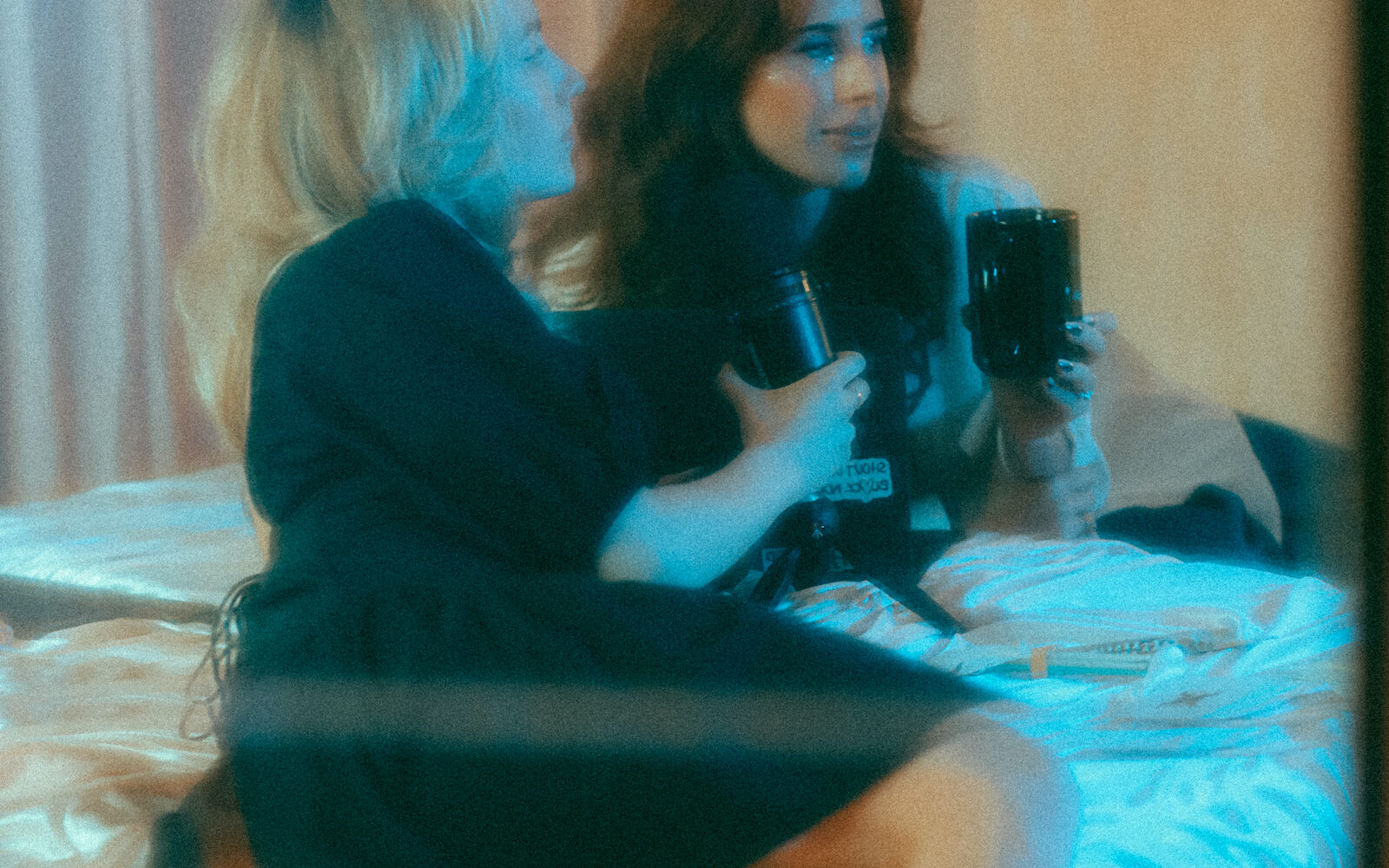
The Brains Behind Holisticism Think Expensive Skincare Is Over, Tools Are Hot, And Compression Is The Next Big Thing In Wellness
Diagnosed with epilepsy at age 17, Holisticism founder and CEO Michelle Pellizzon visited a holistic practitioner in desperate search of an alternative to a seizure drug she was taking that did more harm than good—and never had another seizure again. Inspired by the experience, Pellizzon became a certified holistic nutritionist, but wound up doing her day job in the rather un-holistic technology startup world.
Five years ago, Pellizzon merged her technology and wellness knowledge with the launch of Holisticism, a multifaceted platform aiming to make wellness more accessible and inclusive with resources and education on entrepreneurship and alternative and mystical practices. Holisticism’s ecosystem includes original courses, two podcasts (The Twelfth House and Good For U(?)), newsletter The Cusp, a thriving Mighty Networks community and an Instagram following of 41,000. Beauty and wellness brands have seen the value in what Pellizzon and her team have built: Holisticism has forged partnerships with Lululemon, Sweetgreen and True Botanicals, among others.
Beauty Independent spoke with Pellizzon and Wallis Millar-Blanchaer, Holisticism’s director of brand & content strategy and Pellizzon’s co-host on Good For U(?), where they explore the concept of conscious capitalism in beauty and wellness, about the roots and future of Holisticism and Good For U(?), the fleetingness of TikTok trends, what’s next in beauty and wellness and much more.
What was the inspiration for Holisticism?
Pellizzon: I started Holisticism five years ago as a wellness resource for people to navigate this world from practitioners to products, to what is something like human design. That was before people were talking a lot about astrology in the way that they’re talking about it now. We started that community and that led into what we do a lot more now, which is how do we embrace our intuition and be ourselves in the world so we’re not so Gwyneth Paltrow, completely removed from reality. We’re tapped into our spirituality.
You had raised money for Holisticism, but gave it back. Why?
Pellizzon: We went through a $500,000 pre-seed fundraise and realized that what our investors wanted us to build was not what we wanted to build, so rescinded our contracts and instead decided to see if I could bootstrap Holisticism myself. Thankfully, we’re still kicking four years later.
What led to Good for U(?)?
Pellizzon: A lot of what we talk about is intuitive business. That’s basically how we make our revenue, we teach intuitive business models. We have a community of entrepreneurs. A lot of the conversations we wanted to have around consumption, but also the perspective we both have having worked in tech and just being in this industry for a while, led to Good for U?, wanting to be able to talk about what’s going on behind the scenes at this new company that just raised $10 million as a seed round. It looks like this little DTC company on Instagram, but there’s actually a lot more brewing here. What does that mean for wellness as an industry? It has become this sort of wealth as wellness space.
There’s things that contribute to our wellbeing like buying the new Haus Labs lipstick. I’ve had three people recommend it to me and say it’s the best lipstick they’ve ever bought. Putting that on will make me feel good. But what does that mean? Am I contributing to patriarchal beauty standards? Am I just crumbling under traditional capitalism? Does that make me a less spiritual person? No. That’s where Good for U(?) started.
We talk a lot about being capitalism-critical and to truly be critical of capitalism, you have to be open to asking, “Well, why do I want that thing?” as opposed to just being like, “I’m an anti-capitalist,” shutting the conversation down. That’s where the humanity is. That’s what’s interesting.
Ideally, we’d love Good For U(?) to be a standalone property that can even have its own team separate of Holisticism or at least as a sibling of Holisticism. I think affiliate kickbacks are a fine way to monetize, but, to really grow the business, we’d need to take on sponsorship or figure out another way to monetize that community. We’re not really leaning towards a paid community right now. We’ve done that before in the past and really successfully, but I think the name of the game right now is growing our audience because, once you have a really strong community, you can go anywhere.
How do you approach brand partnerships?
Millar-Blanchaer: We have been very specific about people we partner with, but it’s tricky. We’ll never partner with someone where we actually think the product is crappy. The other thing is that we’re trying to establish a dialogue of, it’s OK to talk about these things. We don’t always have the right answers and don’t pretend to, and we really want to encourage our community to have that type of dialogue with each other. The goal is, how can we break down these barriers and not make these conversations so precious that we can’t even go there?
Pellizzon: We are not going to change the way that we talk about anything regardless of how big we end up getting and how much attention we end up getting from brands, which we’ve already gotten. I actually think that’s in service of where media is going, especially in the TikTok age of people being honest about a product. I think about Mikayla Nogueira, the makeup artist, and how she’ll say, “Yeah, I like this, but I also don’t like this other thing,” and a product will still sell out.
We have a category, which is Scammed By But Would Still Buy. Here’s some things where you’re like, “I know this eyelash serum does not work, but I just like it. I like the process of putting it on. So, I’m going to buy it.” I think that is where influencing is going, and I think that really intelligent brands get that. I hope people are open to our honest editorial perspective.
Millar-Blanchaer: We’re trying to encourage people to make up their own minds. We’re not trying to tear anyone down at any point either. We’re just fair, trying to share our honest experience of, “I wanted to like this product, but it didn’t work for me.” We have differing opinions, and we have people write in all the time to say, “I actually love that product.”
Pellizzon: Plus, we’re two white women with pretty similar hair and pretty similar skin. We live like a mile away from each other in LA, so there are going to be things that we like and that work for us that are not going to work for everyone. And I think that’s the value of the group text community. There’s probably 3000 people in there right now. We wanted to create literally the group text like your friend group text. You can be like, “OK, are we shaving our bikini lines? Or are we waxing? Please let me know what the deal is and the least painful thing.” We want to know those answers, too.
What’s your take on TikTok trends?
Millar-Blanchaer: Right now we’re experiencing, not only on TikTok, these hyper-niche specialized content funnels at insane scale and insane pace. We see it materialize more quickly on TikTok because of the algorithm and because of the number of users and how global it is. It condenses everything that is happening in niche areas of the internet and supercharges it.
Pellizzon: It reminds me a little bit of how Zara or even H&M, they’re pushing out so many SKUs each day basically testing them to see what’s going to hit. I’m seeing with content, here’s this little micro trend, is it going to take off or is it going to have a bump for three days and then we’re never going to think about it again?
I wouldn’t call myself a trend spotter, but I think what we try to do with Good For U(?) is aggregate what are these flares that we’re seeing and what do they mean? What is that pointing to from a cultural zeitgeist perspective? It doesn’t bother me so much because I don’t feel like people take the trends that seriously. I’m 33. I just can’t move that fast. We take in so much media, a lot from Substack right now, I would say more for fact-finding for the podcast, to get our bearings of, is this a real trend or is this just my algorithm that I’m seeing?
Millar-Blanchaer: My grandfather always had the saying, and I was thinking about how I still think it applies today: “Print keeps.” What’s actually historical will surface. It will be relevant a month later, and if it’s not relevant, it will go away. So, it’s not really about the headlines, it’s about what’s the story here? What is going to be historical? The media that we all follow has the same cadence to TikTok. It’s just now delivered in a different form, and there’s this democratization of access. People over the world have access to this platform where they can gain a following and have a voice in a way that we didn’t even really see on Instagram. It’s just evolved.
Pellizzon: What we try to do at Good For U(?) is take these more global or high-level economic trends or zeitgeist trends and put them in this Trojan horse package of, let’s talk about what’s happening at Glossier right now, and let that be an example of what’s happening in real time that maybe people would roll their eyes over or ignore because they don’t think it applies to them because they didn’t go to business school, they don’t work at BlackRock, which couldn’t be further from the truth.
https://www.instagram.com/p/ChDLoUCL6HF/?igshid=YmMyMTA2M2Y=
Are there companies you think are doing it right?
Pellizzon: The first brand I think of is About Face. I’m impressed with their rollout, how they’ve spent money because they’ve spent a ton of money on advertising, and the fact that they’re now in Ulta. That was the perfect product at the perfect time. Halsey was this great combination of model, celebrity, but also someone who uses the product cause she does her own makeup, and that’s so rare.
I think where we’re seeing a lot of fatigue is in celebrity owned-brands in the beauty space. Expensive skincare is out. I honestly think like Rhode and Skkn by Kim is the end of expensive skincare. I think that we’re moving away from that in a really big way. I think we’re going to see a lot more facial manipulation tools. I’m very interested to watch that space because I actually think it does work really well.
Something we’re looking at a lot on Good For U(?) are the brands that we’re seeing basically flood our feeds and our Instagrams with paid advertising and trying to uncover whether that’s a one-person show that happens to just be making their product in China and has a website and they’re basically pulling an Alibaba or if it’s a real brand like let’s say a non-alcoholic beverage company like Kin where there’s real products, there’s real ingredients, there’s a whole team behind it.
Millar-Blanchaer: There’s a formula to nailing the marketing, but ultimately [you need] to have word of mouth recommendations. So much of beauty and makeup is still through these channels of recommendations from friends and peers. Even if you nail the marketing and you have a beautiful brand—Glossier I think has nailed the marketing over the years—time and time again it’s like, “This product sucks. This didn’t last. This cracked.” Ultimately, what’s going to have a lasting effect on people is, is this really a solid product in the end, even if the marketing is flashy?
What do you think of pricy doctor-led skincare brands?
Pellizzon: People feel like they can default to trusting a doctor brand, but I’m curious, as we’re faced with economic instability and recession, if that becomes one of the first things people cut. Depending on where you’re at in terms of finances and experiencing the recession, maybe you’ll spend more money on those things, but, for the most part, people are going to cut spending on that stuff or it’ll slow down.
In Europe, cosmetic dermatology brands are in all of the pharmacies. It’s integrated, and it doesn’t have to be through a doctor. There isn’t this gatekeeping, and it’s not as expensive, but you know that the ingredients are maybe better, and it is cheaper. I feel like that’s got to be coming this way. I felt really frustrated about how expensive the average skincare regimen here feels like it has to be to be effective.
Millar-Blanchaer: I’m really interested in the impending recession and how class consciousness is going to elevate over the next six to 18 months. I think that people will be more likely to pay for something like a NuFace that they know they can use for the next three years every single day as opposed to this little pot of eye cream that may or may not work. From a psychological perspective, it might be easier for people to justify, and they might have the spending power because of things like Klarna or Afterpay to buy these products.
What are products you both love?
Pellizzon: I’m boring right now because I’m six months pregnant. So, everything fun I can’t really use.
Millar-Blanchaer: You have a great device that you actually brought.
Pellizzon: Have you heard of the FasciaBlaster? I loved that thing, and I broke all the handles off. It’s amazing. When I use it on my face, my face changes in real time. It’s incredible. I’m obsessed with that right now and ice rollers—and this ice headband. It’s like compression, and it just feels so good. I feel like it makes a really big difference in my skin. That’s what I’m using right now, but ask me in three months.
Millar-Blanchaer: I really like the Tripollar. It’s radio frequency as well as heat. It’s great. I haven’t used it in almost for two months because I was traveling, and I’m excited to get back into the routine. I see the difference 100% the day after.
Pellizzon: That’s why those things are so addicting, you can literally see it happening. It’s the only thing I found that’s similar to Botox where you’re like, “Yeah, I do look better immediately after using this thing”
What about wellness?
Pellizzon: The thing I’m missing the most and I notice makes the biggest difference is sauna or steam. I really want to get into ice baths as soon as I’m not pregnant. I think that, unfortunately, all of Moon Juice’s supplements work really well. Their Super You, I have ADHD and I noticed a huge difference when I take it, their Super Beauty, Super Hair, that stuff works.
Pellizzon: On the myofascial release trend, I think the next step of that is we’re going to see more compression. There’s this company called Ricari, they do microcurrent all over your body, but they sell these like compression outfits that you can wear, and I actually think that that’s like the gold mine that they’re sitting on because the treatments are so expensive, but the compression really works, and I wouldn’t be surprised if Kim Kardashian got into that next. I really think that that’s going to be a huge trend.
It’s a very unflattering bodysuit that you would put on under your clothes when you’re on a plane or in the middle of the day or at the end of the day to decompress. I think that we’re moving away from cardio. I’m a former New Yorker. and I think we’re going to see less of Barry’s Bootcamp at 5:00 a.m., people killing themselves, doing cardio and a lot more of relaxed, chilling, the opposite of high-intensity workouts.
Is there anything we haven’t talked about that you think is important?
Pellizzon: A global concept that we talk about a lot is identity and how the things that we buy project our identity to ourselves and other people, and how the vilification of consumption in many ways, along with patriarchy saying that it’s stupid, really takes away from and puts a lot of shame on those of us who are pretty intelligent people who are exploring identity, what it means and their relationship to each other. As lighthearted as Good For U(?) is, I think the undercurrent a lot of the time is us asking, “Who do we think we are? What does this say about us?”
Millar-Blanchaer: A lot of what our consumer culture tries to tell us is: You will ascend through this product. It might not be that you will atone for your sins through this service, but you will ascend on some level, you’ll become that version of yourself that, fill in the blank. We’re trying to poke fun at that, but also acknowledge the complexity of how sometimes we’re sucked into it.
We also sometimes hope that we’re going to turn people on to thinking, whether it’s brands or a moment in pop culture or a news story, a little bit differently with a little bit more curiosity and to wrestle with it a little bit more and not write things off as superficial immediately because I think that’s easier to do. It’s easier to be totally nihilistic. We’re trying to find that balance of, what could be what’s underneath it?

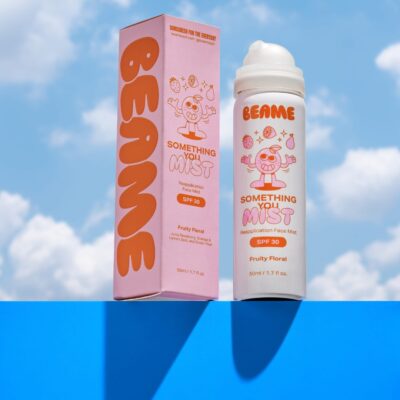
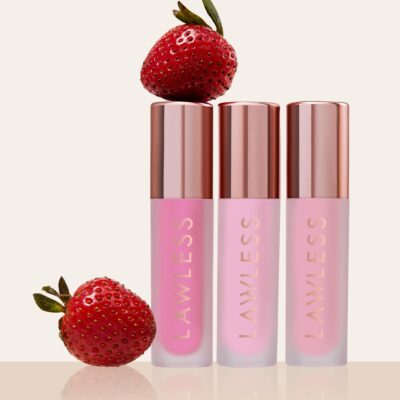
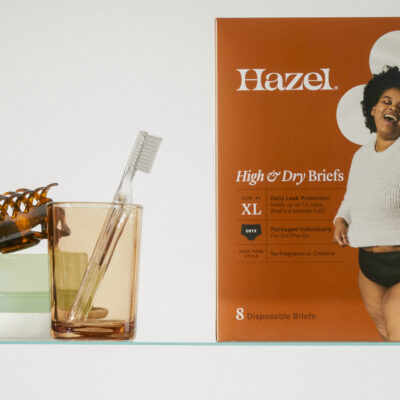
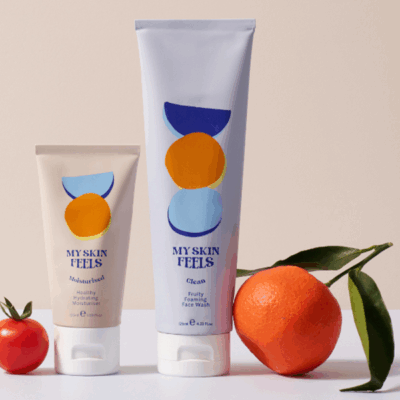
Leave a Reply
You must be logged in to post a comment.